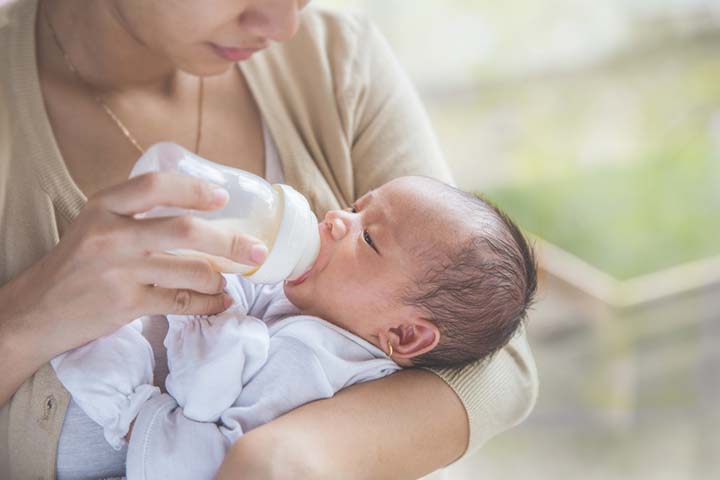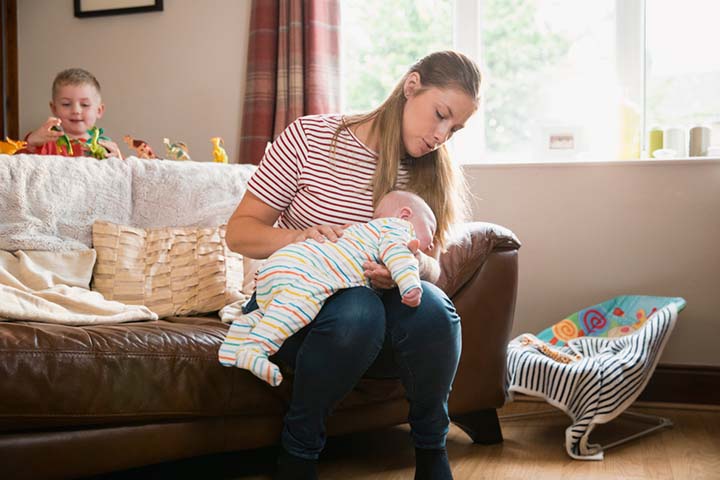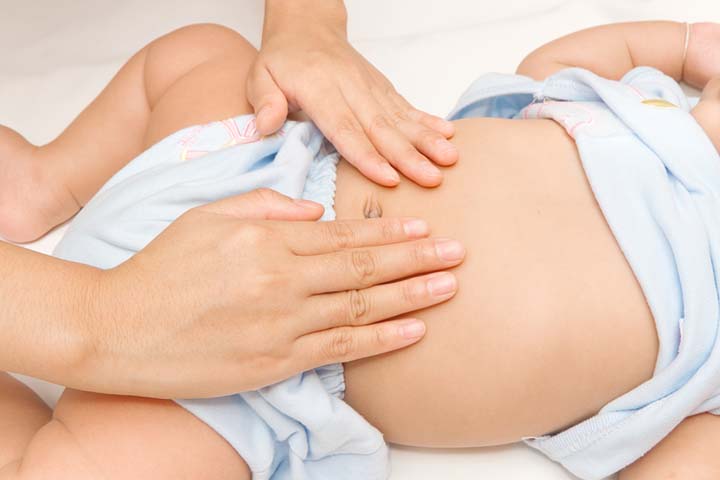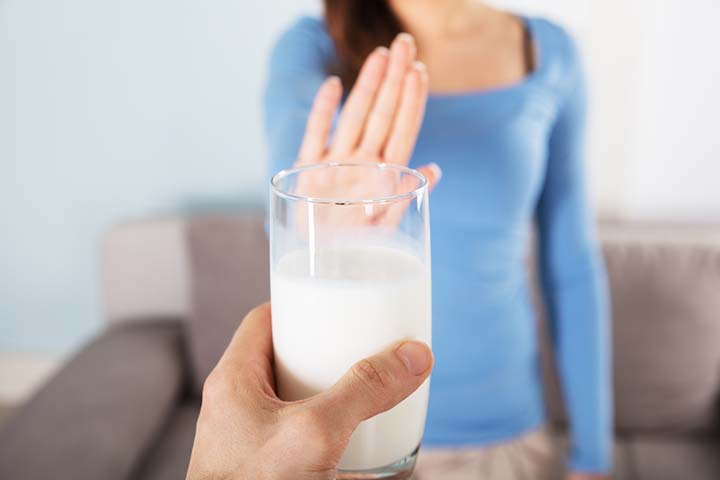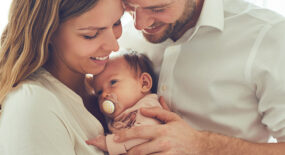Burping is a method of releasing gas from the stomach and esophagus through the mouth. It is also called belching. So, how to burp a newborn? Does it help a baby? Burping is beneficial for a baby, and the lack of it might make a baby cranky and gassy, resulting in spitting up of the feed.
The parent or the caretaker needs to assist the baby to make them burp. This post acquaints you with attributes of burping in babies and how to help an infant burp.
Why Do Newborns Need Burping?
Burping is a convenient way to release any trapped air in the digestive system. When being fed, babies tend to swallow some air. Apart from ingesting it orally, babies may produce gas during digestion. Babies with lactose intolerance or those allergic to formulas may produce excess gas. Similarly, the foods consumed by nursing mothers may produce gas in a few breastfed babies. Therefore, letting your baby burp helps release the formed gas outwards through the mouth which thereby soothes them (1).
When To Burp A Baby?
You may burp your baby anytime they feel fussy. However, the ideal period would be immediately after a feeding session. It could be especially necessary if the baby seems fussy after a feeding session, indicating they have gulped too much air.
You may burp the baby between feeds. If you are bottle-feeding, you may burp them after they are halfway done with the bottle. Care is to be taken to choose the correct size nipple and hold the bottle upside down. That way air ingestion and choking both can be avoided. Do not force the burping by stopping the feeding session abruptly. You may burp when you notice the baby taking a break or when distracted. Else, burp at the end of the feed. One breast at a time is the standard norm.
How To Burp A Newborn Baby?
There are different positions you may try to burp a newborn. First, place a burp cloth around your baby’s mouth as they may spit some milk. This is a normal reaction and is sometimes termed wet burp. You may try these methods to find the one suitable for your little one (2).
Burping when leaning
- Place the baby’s chin on your shoulder while you support them with one hand.
- Use the other hand to pat their back between the shoulder blades gently. Keep the patting as gentle taps.
- Make sure to check on their comfort regularly. On any sign of discomfort, rearrange your position and theirs before attempting burping.
Burping when sitting
- Make your baby sit in an upright position on your lap. They should face away from you.
- Support them by holding their chest with one hand. Next, make them lean forward a bit and place your hand to hold the chin such that they do not fall forward. Ensure that your hand doesn’t block the throat.
- Use the other hand to start rubbing and patting their back. Pat gently between their shoulder blades until they burp.
Burping when lying
- Sit on a chair. Place your baby across in your lap. Gently lay them down while using your hand to support them. The baby should be in a semi-inclined position with the face leaning forward.
- Use one hand to support the baby’s head. Start patting their back gently between their shoulder blades with the other hand.
- Check if the baby is comfortable. If patting seems uncomfortable, you could try giving their back a gentle rub as an alternative.
These burping positions may be attempted on babies who have fallen asleep. Remember to be gentle while doing so and avoid sudden movements to prevent disturbing their sleep.
When To Stop Burping A Baby?
Most babies outgrow the need for burping by the time they are four to six months old (3). By the time a baby is six months old, they gain better control over their bodies. They are capable of moving to a position and making themselves comfortable during feedings. This maturation decreases the need for them to be burped. The baby’s digestive system is also better developed at the age of six months to take solid foods. Once they start consuming solids, they are less likely to swallow too much air while eating.
What To Do If A Baby Doesn’t Burp?
Not all babies burp during or after a feed. Also, breastfed babies may burp less than bottle-fed babies. Melissa, a mother of five from New York, elaborates on her experiences and challenges related to burping her baby. She shares, “In my experience, the first major burping issue you encounter with young babies is that they stop eating and appear to need to burp, yet the burp won’t come. It was happening a lot to me with Bracey (Melissa’s 10-week-old son). Then, I realized his burps were so short and quiet that I wasn’t even noticing them. They sounded like gurgling. That said, to get to this little “blep,” you need a firm but gentle process (i).”
Nevertheless, if the baby does not burp despite your interventions, you may consider the following (4).
- Try to burp them in an upright position for five minutes. To help your baby in burping, you may also sway or rock them softly back and forth, resembling the motion of a pendulum. Better to avoid laying a baby down on their back in the cradle or bed immediately after feeding. Because if the baby suddenly burps and throws up some milk, there is higher chance of choking or aspiration in this position. So, keep the baby in a right lateral position for around five minutes.
- Try massaging the baby’s belly in a circular motion to release gas. It is advisable to refrain from giving a massage to your baby right after a feeding. You may try this when the baby has not eaten but is fussy, indicating it may be due to gas. It is better to keep the baby on your shoulder in an upright posture so that the trapped air comes out.
When To Seek Medical Advice?
Seek the advice of a healthcare provider if you notice that the baby is fussy even after burping. A collaborative study conducted by multiple institutions found that over 25% of infants aged 0-18 months experience daily symptoms of GERD. Therefore, if you notice below given signs, it is advisable to consult a healthcare provider to rule out GERD or other underlying conditions (5) (6).
- Tight belly
- Excessive crying
- Projectile vomiting immediately after feeding
- Hard stool or abnormal stool
How To Minimize Gulping Of Air By The Baby?
You may try a few remedies to prevent the babies from ingesting excess gas.
- Recognize the hunger cues: If you wait for your baby to get extremely hungry, they may end up gulping down the milk hurriedly, swallowing more air. Feed them early by recognizing the early hunger signs such as finger-sucking, lip-smacking, or crying.
- Find the proper latch: The best way to prevent a breastfed baby from ingesting air is to check their latch. Ensure their mouth is sealed around the entire areola and not just the nipples.
- Stir the formula: While mixing the formula, stir the powder into the water rather than shaking it vigorously. Excessive shaking may entrap air into the milk.
- Change the bottle nipple: A bottle with a larger nipple hole may cause a baby to ingest more air. Switch to bottle nipples with smaller holes or those that have a slow flow to prevent the baby from swallowing too much air.
- Alter the feeding position: Avoid feeding your baby while they lie flat. Instead, place their head slightly higher than the rest of their body. Feed bottle-fed babies in an upright position with the bottle tilted at a 40- or 50-degree angle, preventing ingestion of excess air.
- Switch your diet: If you are a nursing mother, a few foods in your diet may cause gassiness in your baby. Try eliminating cruciferous vegetables (cabbage, cauliflower, broccoli) and dairy products from your diet only if your baby is having frequent colics. Otherwise these maybe consumed during breast feeding . Note the changes in your baby to determine if the diet changes worked.
Burping a baby usually takes a few minutes, and most babies are calm after they have burped. You may switch burping positions to find the right one for your baby. Also, try the common tricks to prevent the baby from ingesting excess gas. Most babies outgrow the need for burping once they begin consuming solids. If your baby continues to be fussy after burping or you notice other issues, do not hesitate to speak to a pediatrician.
Key Pointers
- Babies need to be burped after a feed to release trapped air in their intestines.
- Burping helps prevent gassiness and spitting up in babies.
- Babies may be burped in leaning, sitting, or lying down positions.
- You may stop burping your baby once they are six months old.
- Minimize babies gulping air by recognizing hunger cues, latching properly, altering the feeding position, or changing the bottle nipple.
Learn how to burp your newborn baby with ease! Follow the simple steps given in this video and you’ll be able to burp your baby like a pro in no time!

